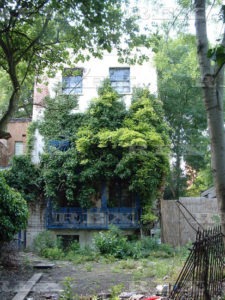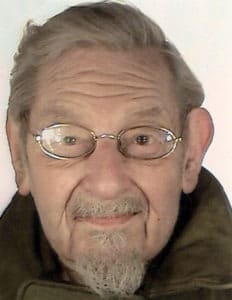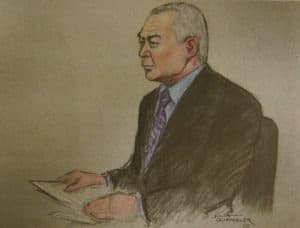Books
Blood on the Page: a most mysterious murder
Images © REX/Shutterstock
‘Hello, my name is Thomas Harding,’ I said into the phone. ‘Is that Pete Lansdown?’
‘How the hell did you get this number?’ responded the former homicide chief.
I told Pete ‘Lips’ Lansdown’ that I’d spotted his name in one of the early articles about the case and, after a couple of hours searching online, had found a PDF with his name and mobile number. ‘Not bad,’ he said. ‘You’d make a good police investigator.’
It was the spring of 2017 and I was researching the brutal killing of Allan Chappelow, the 86-year-old author who ten years earlier had been bludgeoned to death at his home in Hampstead, northwest London.
 Allan was my neighbour when I was growing up. I remembered him fondly as the quiet if peculiar old man who lived a few doors away; a familiar fixture of my childhood, not the victim of a brutal murder. I couldn’t fathom why he had been killed, and neither could the local community. The only reports that existed failed to provide answers. And so I began to investigate myself. When I started, I knew little about how a modern homicide inquiry worked. But I would soon found out.
Allan was my neighbour when I was growing up. I remembered him fondly as the quiet if peculiar old man who lived a few doors away; a familiar fixture of my childhood, not the victim of a brutal murder. I couldn’t fathom why he had been killed, and neither could the local community. The only reports that existed failed to provide answers. And so I began to investigate myself. When I started, I knew little about how a modern homicide inquiry worked. But I would soon found out.
Luckily, both of the police officers who ran the inquiry were both willing to talk – on the record. The name of the second, DS Peter Devlin, was given to me by Lansdown. Apparently, Devlin had recently retired and was living in Ireland.
I couldn’t find Devlin online so I contacted the National Association of Retired Police Officers. They told me there was no Peter Devlin living in Ireland, but someone in England was receiving his pension cheques. If I sent them a letter they would forward it to him. Six weeks later, I met Devlin in a restaurant on the banks of the Thames. He told me that he had no regrets about the case. They had, he told me, ‘100% got the right man.’
Tracking down people who knew Chappelow was easy. I knocked on doors, made phone calls and sent emails. Soon I was learning how the murder of someone living close impacted one’s life. Some said that they felt guilty for not taking better care of the victim; he lived by himself and from the outside it was clear that he was unable to take care of his dilapidated house. Others remembered him fondly, the man who fixed the holes in his roof with plastic bags, who drove around on a rusting Norton motorcycle, his gabardine coat tied with rope and flapping in the wind. Others were simply curious because the crime had generated so much media intrigue.
There was much about Chappelow that I still didn’t know, and so I began to trace what family he had. Perhaps of all those I contacted, I found speaking with his relatives the most difficult task of all.
None of them knew Allan well, if at all. Indeed, at his funeral, the priest was forced to base his eulogy on a short biography printed on the back cover of one of Allan’s published books. But although they may not have known him, those who had met him were certainly fond of him. His cousin in Denmark remembered him from their youth, his visits during the summer, his ability to tell a good story. Another cousin from Austin Texas, recalled Allan’s recent visit, their dinner at a local restaurant, where they’d laughed and talked over barbeque ribs, grits and beans, his excitement at researching at the nearby university palpable.
 A broader portrait of the victim was beginning to emerge. The man convicted of the murder, however, was still a ghost-like figure. I needed to get his perspective. But speaking to him was not going to be so easy.
A broader portrait of the victim was beginning to emerge. The man convicted of the murder, however, was still a ghost-like figure. I needed to get his perspective. But speaking to him was not going to be so easy.
Wang Yan was locked up in one of Britain’s highest security prisons, HMP Whitemoor. I first wrote to him, but my letter was confiscated by the governor. The Ministry of Justice then refused my request to visit him (even though journalists are allowed prison visits if in the public interest). As Wang Yam was not allowed to make phone calls I had no way of reaching him. Then, luckily, he was moved to Lowdham Grange – a category B prison with a much more relaxed communication policy.
I was at home watching TV one night when the phone rang. My wife told me not to answer, but something about the number caught my attention.
‘Hello’, came a timid voice, ‘this is Wang Yam. Do you know who I am?’ It was the beginning of a long correspondence. Slowly, and over the course of many conversations, Wang Yam told me about his life: about his childhood growing up in a rural Chinese village, about his education and activism, and his role in the Tiananmen Square protests, about how he sought asylum in the UK and was asked to ‘get alongside’ a group of Chinese gangsters ‘as a means of assembling evidence against them and reporting them.’
Gradually, piece by piece, the jigsaw puzzle of these two lives and the crime that connected them began to surface. My detective work was paying off. There was, however, one key piece missing: one obstacle blocking me from getting the full truth about the case. Parts of the murder trial were held in secret. This was because, according to multiple reports in the press, the defendant was a ‘low-level informant’ for the Secret Intelligent Service, more commonly known as Mi6.
Wang Yam vs Regina was the first murder trial in modern British history to be held in camera: closed, carefully controlled, secret. Despite repeated lobbying by the press, it remains secret to this day.
But not only did the court order prevent journalists like me from reporting on the closed court sessions, it also stopped me from speculating why the trial was held in secret. There was, I quickly discovered, a major lacuna at the heart of the story. Despite my investigative efforts, I would not be able to reveal the full story after all.
Some might argue that there is no point in writing a book about a story with such a lacuna at its heart. That it is best written as fiction, where legal restrictions do not apply. I believe the exact opposite is true. It is exactly because the government has imposed reporting restriction that I have the responsibility to write this story with a passionate grip on the truth, an objective eye and in as much depth as I am legally able.
I can also reveal that though the secrecy surrounding Wang Yam’s trial remains intriguing, and the inability to report on it is truly frustrating, from the whispers I have heard during my two years of research, none of the evidence or testimony heard during the secret parts of Wang Yam’s trial would have made a huge difference. Indeed, the first trial jury was unable to agree on a guilty verdict. It appears to me, therefore, that the secret trial was actually a massive red herring.
With one exception.
 Because significant parts of the proceedings were held in secret, the media was unable to fully examine the evidence. This led to a cloud of mystery which Wang Yam’s lawyer Geoffrey Robertson argued dissuaded witnesses from coming forward. Indeed, it was only in 2014, six years after the first trial, that Jonathan Bean – who lived four doors from the victim – testified that he had suffered a violent burglary a few months after Chappelow’s murder. Bean told the local police at the time that he believed that the two crimes were linked. Critically, this report never made it to the homicide investigation. Robertson believes that if this evidence had been supplied to the original jury – which was after all split as to the defendant’s guilt – they may well have come up with a different outcome.
Because significant parts of the proceedings were held in secret, the media was unable to fully examine the evidence. This led to a cloud of mystery which Wang Yam’s lawyer Geoffrey Robertson argued dissuaded witnesses from coming forward. Indeed, it was only in 2014, six years after the first trial, that Jonathan Bean – who lived four doors from the victim – testified that he had suffered a violent burglary a few months after Chappelow’s murder. Bean told the local police at the time that he believed that the two crimes were linked. Critically, this report never made it to the homicide investigation. Robertson believes that if this evidence had been supplied to the original jury – which was after all split as to the defendant’s guilt – they may well have come up with a different outcome.
After two years of research, I now know a lot about one of the most mysterious and momentous murder cases of this century, and the two men at its heart. I’ve also learned a little more about how a homicide investigation works. Perhaps it’s time to call ‘Lips’ again and see if he has an opening available.
Intrigued? Read an extract from Blood on the Page by Thomas Harding here, or find out more about the murder of Allan Chappelow here.
1 Comment
Join the discussion
Please note: Moderation is enabled and may delay your comment being posted. There is no need to resubmit your comment. By posting a comment you are agreeing to the website Terms of Use.



Interesting, but no further forward. I knew chappelow in the 60s when , with a friend we repaired his Vincent rapide m/cycle he was a pleasant chap but very modest his house was………..different.